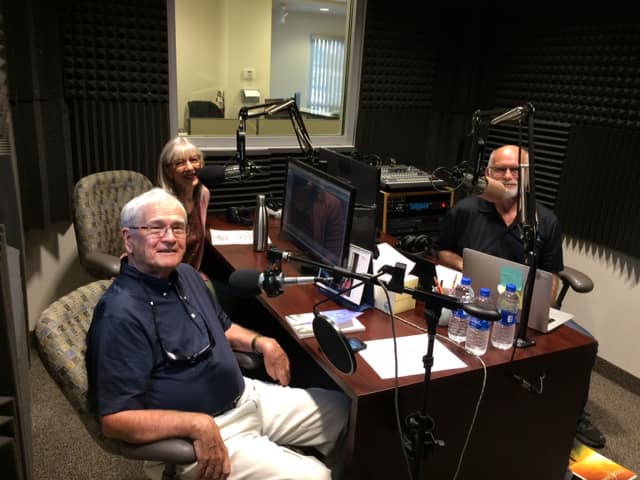A special guest, Chris Schoenleb, tells his story about his terminal diagnosis of Lou Gehrig’s disease and then, his miraculous healing. Come with us on this miraculous journey in this week’s podcast.
Note: Below is a transcription of this Walking Our Talk podcast. Please excuse any grammatical or punctuation flaws, as the transcription is a written version of our fluid conversation.
Pauly [00:00:07] Welcome to walking our talk with Alan and Pauly Heller. Join our conversation as we discuss practical ways to apply spiritual principles to your everyday life and help you walk your talk one step at a time.
Alan [00:00:28] On November 28, 1995, author Chris Schoenleb’s life changed forever. He was told by the Mayo Clinic that he had Lou Gehrig’s disease and had no more than two years to live. In Only God Could Heal Me, Schoenleb tells the story of his job like struggles over the four years following his diagnosis. He vividly describes his emotional rollercoaster of trying to live as normally as possible first while planning for his death, and then later while searching for healing after his diagnosis was changed to a non-fatal but totally crippling neurological disorder. Finally, he describes the miraculous end to his struggles healing, totally unexplainable to modern medicine. So we have Chris Schoenleb here today. Good to see you, Chris.
Chris [00:01:28] Thank you, Alan. Great to be here.
Alan [00:01:30] Thanks for doing this. And we also have Pauly.
Pauly [00:01:33] Hello.
Chris [00:01:34] And, you know, we do we have guests every once in a while. And I just thought this would be a terrific encouragement. You know, your story is, as most Christians would say when the miracle happens. I can’t believe it. You know, it’s unbelievable. So tell us a little bit about yourself and your family. You’ve had quite a colorful life.
Chris [00:01:57] Well, thank you. I was thinking about what I would say about that question because you gave it to me ahead of time before I came. And I guess the best way to talk about me is to say I lived the all-American life force for 61 years. I grew up in northeastern Ohio, went to college, married my high school sweetheart, got a job, went up the corporate ladder, moved a lot. We had four children. And during all that time, while we were moving around, I kept going up higher and higher until finally in 1981, I was in Atlanta, Georgia, president of Arby’s. And my wife had become a Christian in about three years prior to that. And our marriage wasn’t in the best of shape because of my crawling up the corporate ladder. And you can imagine we lived in eight different cities trying to raise four kids over a period of 25 years. Difficult.
Alan [00:03:01] Yeah. And you give some crazy numbers. You’ve moved how many times in your life?
Chris [00:03:08] Well, my wife and I have a different number.
Alan [00:03:10] I heard you say 37 one time.
Chris [00:03:12] Yeah, 37 is about right. That counts going in and out of storage.
Alan [00:03:15] Joanne may, you know, have a little different one, but it’s OK. That’s a lot of moving.
Chris [00:03:21] Yeah. And anyway, I found the Lord in 1981 after going to church and listening to a pastor just to suddenly touch my soul. I’d always been a Christian in the sense that I’d gone to church and that kind of thing. But I was a cultural Christian.
Alan [00:03:40] Hmm.
Chris [00:03:41] We raised our kids and we baptized them and all that good stuff.
Alan [00:03:44] So what specifically changed that day, would you say?
Chris [00:03:48] You know, I had a dream that scared the living bejesus out, that the devil showed up at the front door and invited me to join him. Really? I woke up screaming. I really did. As a 47-year-old guy. So, I mean, I immediately went to the pastor and I talked to him and I accepted the Lord. And from then on, life was very different. Wow. And I live that way with my life being. I was still a hard-driving businessman. I moved from Arby’s to Phenix, where I became president of Swensons. And then I moved back to Charlotte, North Carolina. And then I moved to Chicago, where I had my own ad agency. And all during that time, God was with me then, but I wasn’t putting him first. And then that all changed when as you read from the cover of my book on November 28, 1995, I found I was going to die.
Alan [00:04:52] So and when did you make this decision to come to know the Lord in relationship to that next thing that happened? How many years in between?
Chris [00:05:01] Fifteen.
Alan [00:05:02] Fifteen years. So you started your journey with the Lord and it got more serious over those 15 years. And then you faced probably the greatest trial of your life, right?
Chris [00:05:13] Yeah, I think the good Lord was trying to get my attention because from whenever I got a new job and I became president of three different companies and president of my own. I got fired. And so I think and I finally got tired of getting my attention any other way. So he sent me to the Mayo Clinic and I found out I had Lou Gehrig’s disease and I had two years to live or less. And that changed my life forever.
Alan [00:05:42] And what kinds of things happen? Family dynamics. How did Joanne take it? How did your family take it? What went on in the family dynamics?
Chris [00:05:52] Well, I have a very strong wife. A woman would have to be very strong to raise a family of four kids and move as many times as we moved, set up shop, build a new life. She was a stay at home mom who went back and got four years of a college education while she was raising four teenagers.
Alan [00:06:13] And I would say very just a wonderful. She teaches the Bible in a small group every week and is has a gift for teaching.
Chris [00:06:24] Yes. She’s been very gifted in that way. And she’s really become a Bible scholar. She frightens me whenever we want to have a Bible discussion.
Alan [00:06:32] And how many years have you been married?
Chris [00:06:35] Sixty four next week.
Alan [00:06:38] Wow, that’s great. And we wanted to ask you the ultimate question of I mean, anybody who’s lasted 61 years. I mean, what was the secret of doing that?
 Chris [00:06:50] Sixty four not 61. What’s the secret? We often talk about that. People ask us that occasionally. My wife would answer perseverance. Because there are some years that aren’t so good and some years that are so good. And unless you are persevering. And she’d also add the word commitment.
Chris [00:06:50] Sixty four not 61. What’s the secret? We often talk about that. People ask us that occasionally. My wife would answer perseverance. Because there are some years that aren’t so good and some years that are so good. And unless you are persevering. And she’d also add the word commitment.
Alan [00:07:11] Mmhmm.
Chris [00:07:12] And unless you have a commitment, a commitment that you made to God in the first place and you keep that commitment, you won’t make it through marriage. There are days when you want you’re ready to bash your spouse and run off. And both of us went through that, particularly since we’re both type-As. But I would add that I think you have to have mutual respect if you don’t respect your wife. If I don’t respect my wife and her opinions and listen to her and if she doesn’t respect my opinions and listen to me, if we don’t somehow come to an agreement on how we’re gonna live life together, that is satisfactory to both of us. It just won’t work.
Alan [00:07:58] So did you get there through trial and error or did you sit down together and say, hey, we need to talk about this?
Chris [00:08:07] I don’t think very many people do by sitting down and talking about it. I think its life is trial and error. And I would say in marriage there are. There are several key years, the first year when you’re learning how to live with one another and what it’s all about. I would say when the first child comes, your life totally changes.
Alan [00:08:26] That’s for sure.
Chris [00:08:28] And then when you become an empty nester and all the kids are gone, that’s another adjustment. But I think the biggest adjustment unless you have the event I had which is being told you’re going to die, your whole spouse’s gonna die is, I think, the biggest adjustment’s retirement.
Alan [00:08:46] Hmm.
Chris [00:08:47] Because I know it was for me.
Alan [00:08:51] And what about that? What about retirement? What was the hardest thing for you? Because you were a hard charger in business and you.
Chris [00:08:59] Well, I didn’t know what to do. I looked around. I didn’t have to go to work that day. And I’d worked every day since my 12th birthday. And here I was. I was at home. What did I do? I went to my office and I made some phone calls because that’s what I did at work. But in the end, I was in my wife’s space. And it was her castle, not mine. And I had to learn. And she had to learn how to adjust to that because my wife did have one rule about marriage. For better or for worse, but never for lunch.
Pauly [00:09:38] Yeah, that sounds like me. I never make lunch for Alan.
Alan [00:09:46] One year she for Christmas. She gave me a bucket. It said “Alan’s Lunch” and she said, I’m committed to making your lunch every day this year. And after the 365th day, you know what happened?
Chris [00:10:00] What?
Alan [00:10:00] Nothing ever again. I never had that expectation again.
Alan [00:10:07] All right. Well, we’re talking with Chris Schoenleb. And this is Alan Heller. We’re walking our talk. And if you want to get in touch with us, you can just go to our Web site, walkandtalk.org. So we’re talking with Chris Schoenlab. He wrote a book called Only God Could Heal Me. He also wrote a great book in marketing, which, what’s the name of that one?
Chris [00:10:40] Battling Marketing Myths, Foxhole Tales from a Corporate Lawyer.
Alan [00:10:44] Yes. So he has extensive exterior experience in that and has been used as a textbook and that sort of thing. So if you’re interested in marketing, you might want to go on Amazon and get that one. And certainly, we want to hear a little bit more about the details of Chris was told he had ALS and was told he was going to die. So tell us the rest of the story here.
Chris [00:11:09] Well, I think the first thing is the initial shock.
Pauly [00:11:14] What was the first thing you experienced? Like how did you even think to go to the doctor?
Chris [00:11:20] Oh, well, I had a period in which my health got progressively worse. I lost the use of my wrist and I was having very great difficulty walking. And I had gone to a couple of neurologists that this is just one of my doctor. And they had both said, we don’t know what’s wrong with you, but it may be ALS. My wife, I did not tell this I and she became very suspicious because I didn’t want to worry her until somebody gave me a diagnosis. So she called my doctor, got the name of the best neurologist she could find, which was at the Mayo Clinic, made the appointment and said, you’re going now.
Alan [00:12:03] Which tells us a little bit about your wife.
Chris [00:12:06] And so I went and when we went, I was very happy to go, because if you live with uncertainty about a disease, you want to know.
Alan [00:12:19] You have a lot of anxiety I would think.
Chris [00:12:21] If you don’t know, it’s worse than if you do know.
Pauly [00:12:24] Yeah. You want to name it.
Chris [00:12:26] Yeah. You want to name it. And if you’re gonna if you’re if it’s bad news, let’s get it over with. So at any rate, my first thought after we were told finally by doc, by our doctors that this was what was gonna happen to me. My first thought was. What do I do now to make sure my family’s OK? I was really surprised. I’ve been a very self-centered guy all my life, but I found out my faith was really strong. I wasn’t afraid of what was going to happen to me. I was very concerned about what was going to happen to my family because I knew taking care of an ALS patient can cost. In those days, and that’s 25 years ago. It could cost 500 to 700 thousand dollars a year.
Alan [00:13:14] Wow.
Chris [00:13:14] For 24 hour care and all that kind of stuff.
Alan [00:13:17] So from there, what did you decide to do?
Chris [00:13:20] Well, my wife and I decided that we would just live life as normally as we could as long as we could.
Alan [00:13:29] And could you?
Chris [00:13:30] Yes, ALS, this kind of disease is gradual. It’s not as gradual as, say, M.S. or some of those. But at first, I could walk and I could use my hands a little bit. And so we decided that we would do whatever we could to make life as rich as we could as long as we can.
Alan [00:13:54] What were some of those things that you did over the next few years? A couple of years.
Chris [00:13:58] Well, what’s the next year. Because after that, it was pretty tough. But the next year, the first thing we did was we said, well, we’ve been invited to go to the Rose Bowl to see the parade and the game. And we were sponsoring a float so we could go behind the scenes and see it. So we went. And following that, we celebrate our fortieth wedding anniversary by cashing in all my frequent flier miles, which were a few.
Pauly [00:14:24] Everything that was on your bucket list.
Chris [00:14:26] No, no, I didn’t have we didn’t have a bucket list. But but but this would have been on it.
Alan [00:14:31] If you had one.
Chris [00:14:32] Yeah. So we went to Hong Kong, the island of Bali, and the nation of Australia. And we had a great time. We spent three weeks. I spent all the money I could. First-class air, first-class, everything. Because, you know, this is the last trip. And it’s sort of surreal. You really can’t cope with that.
Alan [00:14:57] You can’t comprehend it.
 Chris [00:14:58] No. And but fortunately, I had enough health at that point that I could walk and do those things. What else did we do? We went down and talked to the lawyer, got all of our will and health power of attorney because I did not want to have artificial means of keeping me alive. I wanted to get out of here as soon as I could. I knew where I was going. Right. At least I’m pretty sure I knew where I was going. And I knew I didn’t want to stay here in pain. Right. So other than that, I tried to say goodbye. Well, I went to my fortieth college class reunion and said goodbye to all my buddies in college and we then had a special reunion with two of my best friends from college and their wives for an extra couple of days. I spent time with my kids because when you’re growing up with type a business guy like me who traveled every week, they didn’t get to know their dad as well as they should. And it was then that I was complaining that I didn’t really know what I was gonna do. And my son suggested I write a book because if I was going to die, maybe I should tell some of my stories before I die.
Chris [00:14:58] No. And but fortunately, I had enough health at that point that I could walk and do those things. What else did we do? We went down and talked to the lawyer, got all of our will and health power of attorney because I did not want to have artificial means of keeping me alive. I wanted to get out of here as soon as I could. I knew where I was going. Right. At least I’m pretty sure I knew where I was going. And I knew I didn’t want to stay here in pain. Right. So other than that, I tried to say goodbye. Well, I went to my fortieth college class reunion and said goodbye to all my buddies in college and we then had a special reunion with two of my best friends from college and their wives for an extra couple of days. I spent time with my kids because when you’re growing up with type a business guy like me who traveled every week, they didn’t get to know their dad as well as they should. And it was then that I was complaining that I didn’t really know what I was gonna do. And my son suggested I write a book because if I was going to die, maybe I should tell some of my stories before I die.
Alan [00:16:18] So that’s the impetus of writing the book.
Chris [00:16:20] Writing the first book, yeah.
Alan [00:16:21] OK. And so then what was the next major thing that happened after that?
Chris [00:16:27] Next major thing that happened after that was that one of the other neurologists that I went to said, you know, I don’t think you have ALS.
Alan [00:16:38] Oh no.
Chris [00:16:38] So that created uncertainty in my life of no end because the Mayo Clinic said I did. This guy said I didn’t. What do I do now? Well, my wife came to the fore and said, you know, we think he should try alternative medicine. So I tried alternative medicine. I tried two different kinds of alternative medicine. One was an internist who cut your hair and major things that other doctors didn’t do. And after he advised me to take out all my teeth, I decided I didn’t want to go to him anymore.
Alan [00:17:17] I can understand that.
Chris [00:17:18] And then I went to a nutritionist, who put me on a diet to cleanse my blood, to get everything out of my blood. It was a high protein, low fat, low carb diet that I lost 18 pounds on in 30 days. And my wife cooked 24/7, she said.
Alan [00:17:38] Wow.
Chris [00:17:38] That didn’t work. Nothing worked. I went back to the Mayo. The Mayo said, Chris, we are not sure, but maybe your other guy is right. We can try some things. So we tried a couple of treatments, I.V. IG treatment, and that didn’t work because of an I.V. IG treatment. I don’t know what it does, but it does something. It attacks your autoimmune system because you’re autoimmune system was really out of whack. Right. And then they tried plasmapheresis, which is nothing more than taking all the blood out of your body and putting it back in with new white corpuscles.
Pauly [00:18:15] Right. Our son did that.
Chris [00:18:17] I did. I did 26 of those.
Alan [00:18:19] Wow. Any help?
Chris [00:18:22] No. No help. None whatsoever. So it at the end of the year and almost two years, the Mayo Clinic said we don’t know what’s wrong with you.
Alan [00:18:32] And is your health getting worse?
Chris [00:18:33] Every day I would wake up and not know what wasn’t going to work. By the time we’re talking about now, I had wrist drop. I had no ability to use my wrist whatsoever. I had braces on my wrist. I couldn’t walk beyond about a block. And I was drinking everything through a straw. I don’t know whether you’ve ever tried to drink coffee through a straw. But it’s difficult. And I couldn’t cut anything. I couldn’t do anything. But I still went to work because I could still dress myself. Within another six months or so, I couldn’t dress myself. So I had to retire, so to speak. So it was just a progressed, slow, progressive downturn. And finally, the Mayo Clinic said, we want you to go to Rochester. And I went to see the head neurologist. And the neurologist said, I have good news and bad news after a week of testing. You’re gonna be a total cripple by the year 2000. But don’t worry, you can still have your mind. You won’t have any arms or any legs. And then a year later, I got better.
Alan [00:19:48] Wow.
Chris [00:19:50] I got 50 percent of what I’d lost back. And because of that, I could walk again. I could dress myself again. I could work again.
Alan [00:20:00] And again, you didn’t know how that all happened? It just happened.
 Chris [00:20:03] It just happened over a period of about 30, 90 days. It’s not like oneof those miracles in the Bible. But it happened and there’s absolutely no explanation for it other than to God did it.
Chris [00:20:03] It just happened over a period of about 30, 90 days. It’s not like oneof those miracles in the Bible. But it happened and there’s absolutely no explanation for it other than to God did it.
Pauly [00:20:15] Wow.
Alan [00:20:16] Well, we’re talking with Chris Schoenleb who basically God healed of ALS. If you want to get his book on Amazon, it’s called Only God Could Heal Me. And if you want to get it from us, you can just write to our go on our Web site, walkandtalk.org, And get in touch with us. We’re going to go through what happened after he got healed. Do one more podcast. Well, you really want to tune into that next time. So this is Alan Heller and Pauly, who has been speaking so much, I just don’t know what to do with her. And we’re hoping that you will walk your talk.
Pauly [00:21:01] This has been walking our talk with Alan and Pauly Heller, where we put into action those principles. We know from God’s word one step at a time. You can find more help at our Web site, walkandtalk.org.

